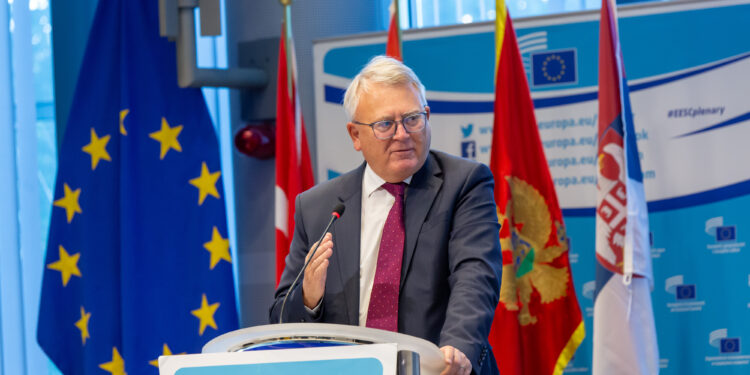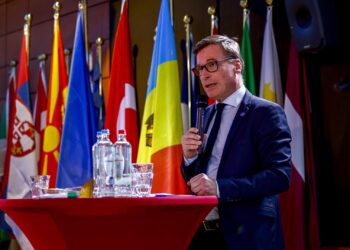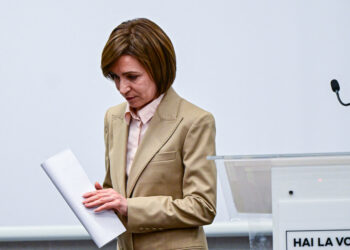Brussels – The new European Commission must be the “Commission of Enlargement”. This, in a nutshell, is one of the main messages emerging from the plenary of the European Economic and Social Committee (EESC) in Brussels, where among the guests stands out, in addition to the president Oliver Röpke, the outgoing Commissioner for Social Affairs Nicolas Schmit. As the head of the EU executive, Ursula von der Leyen, continues her tour to the Western Balkans, civil society representatives in the EU capital emphasize the importance of involving the social partners of the candidate countries to better prepare for accession.
The debate at EESC
These are busy weeks for the nine states awarded the status of candidates for EU accession (Albania, Georgia, Kosovo, North Macedonia, Moldova, Montenegro, Serbia, Turkey, and Ukraine), and especially for the five in the Western Balkans, which just yesterday received their first tranche of funds disbursed under Brussels’s Plan for Growth.
Today (Oct. 24) in the European capital, the EESC is hosting the High-Level Forum on Enlargement on the second day of its 591st plenary, with several guests of honour, including Commissioner Schmit, his fellow Enlargement holder Olivér Várhelyi (who sent a pre-recorded message) and several ministers with delegated responsibilities for Labor and Social Affairs: Greece’s Niki Kerameus and Germany’s Rolf Schmachtenberg representing the EU member states and, as candidate countries, Montenegrin Naida Nišić and Albanian Olta Majani.
The focus of the discussions, which continued into the afternoon with three thematic sessions, revolved around the active participation of civil society in paving the way for the accession of candidate states. This is an issue on which the EESC has been insisting for a long time: the idea, in essence, is to enable these countries to prepare in advance—that is, before formal membership in the European club—the democratic, socio-economic, and cultural structures that will prove to be fundamental to living in the Union. And so, for the first time, more than 140 civil society representatives from those states were welcomed to a plenary session of the institution in the context of the pilot initiative Enlargement candidate members (ECM).
Extension from the bottom
In Röpke’s words, it is a way “to make enlargement a success for all“: for newcomers and existing members alike, “and to make it as inclusive and participatory as possible” through the effort to “build a bridge between civil society and European policy-making.” “This is not about expanding the EU,” he explained, “but about preparing future member states to participate actively in shaping the Union, ensuring that they are fully equipped to meet the challenges ahead.” Schmit was also in the same vein: “Enlargement is about the involvement of peoples and societies, in the candidate countries as well as in the member states,” he said at a press point on the sidelines of the Forum, stressing the importance of “bringing civil society and the social partners of the candidate countries to the political and decision-making processes of the EU.”
In short, it is a “step-by-step integration” starting from the bottom up. For example, a key point addressed during the conference concerns the national labour markets of the candidate countries, which need to be progressively harmonized with those of the member states.
This is as complex as it is important work because, as all the guests mentioned, the goal of economic prosperity within the twelve-star single market must be balanced with social protection and the protection of workers’ fundamental rights.
There is no predefined timetable for enlargement: some countries have unilaterally given themselves a specific target (e.g., Albania fixed 2030 as its goal for accession, and Deputy Minister Manjani assured that “joining the EU has been the dream of Albanians since the 1990s”), but it is crucial to maintain a strong commitment and offer “clear signals” to the public opinions in question so that they concretely perceive the benefits of EU membership, even before officially joining the twelve-star club. “There is a need for success stories,” the EESC president stressed, “and countries that achieve successes should be rewarded” with actual progress on their path to Brussels.
The geopolitical dimension
But, Schmit warned, “enlargement must also be a success for geopolitical reasons,” as demonstrated by the recent Moldovan elections (where, Röpke assured, disinformation has reached unprecedented levels) but also from the situation in Ukraine and Georgia, Moscow has every interest in destabilizing the area between its borders and those of the EU to prevent other countries from taking the European trajectory (“the only possible one for us,” according to Montenegrin Minister Nišić). “Times have changed,” the outgoing commissioner said, and “new divisions are emerging in Europe” decades after the dissolution of the Iron Curtain: the challenge, in the face of “enlargement fatigue that Russia is exploiting” is to “maintain the positive message” of the benefits of joining the European family, to “maintain the momentum and show these countries that Europe carries through on its commitments.”
This, after all, is also the point of the new Growth Plan, which, with a €6 billion endowment, aims to stimulate the economies of the Western Balkans with targeted investments (e.g., on energy production from renewable sources and sustainable mobility) that aim to achieve the social-economic convergence of the states in the region with the rest of the EU, as reiterated by von der Leyen, who was in Skopje on the second leg of her Balkan tour.
Talking to reporters alongside Prime Minister Hristijan Mickoski, the Commission chairwoman said Brussels’ goal is “to open negotiations on the cluster of key chapters as soon as possible,” as soon as North Macedonia has made the amendments to its Constitution demanded by the Twenty-Seven about the protection of the Bulgarian language minority. The premier expects “shared efforts, cooperation, dialogue and mutual understanding” from European partners.
However, Skopje’s path to the EU has been slowed recently by several missteps, culminating in the last May election victory of Mickoski’s conservative VMRO-DPMNE party, whose nationalist rhetoric has strained relations with Sofia and Athens. Brussels decided last month to split Northern Macedonia’s accession path from Albania, which is now proceeding more expeditiously than its eastern neighbour.
English version by the Translation Service of Withub






